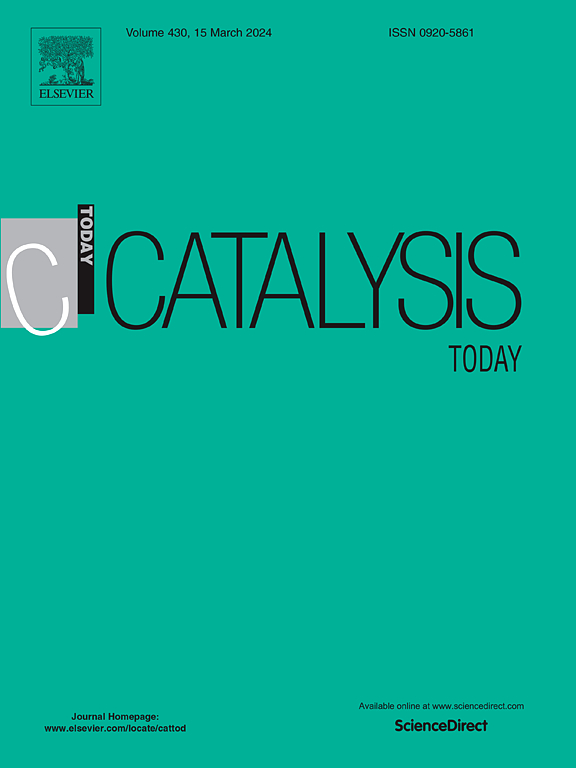Bimetallic palladium and copper single atoms catalyst boosting direct oxidation of methane to formaldehyde with 100 % selectivity at room temperature
IF 5.2
2区 化学
Q1 CHEMISTRY, APPLIED
引用次数: 0
Abstract
Direct oxidation of methane (DOM) to sole value-added products (such as HCHO, etc.) at room temperature is of great importance for synthesis of commodity chemicals but still remains challenging. Herein, we design and construct ZSM-5 supported bimetallic palladium and copper single atoms catalysts (Pd1-Cu1/ZSM-5) via modified co-adsorption strategy to promote the DOM by using molecular oxygen (O2) with the assistance of hydrogen (H2) at room temperature. The Pd1-Cu1/ZSM-5 achieves a remarkable formaldehyde selectivity of 100 % (yield of 22.7 μmol·gcat−1·h−1) at room temperature and the reaction atmosphere is out of the explosive limits of CH4/H2/O2 systems. The characterization results demonstrate that the synergistic effect between palladium and copper facilitates the formation of highly reactive surface hydroxyl species to activate C-H bonds of CH4, which is the key for the high performance of DOM over Pd1-Cu1/ZSM-5 compared with that of sole Pd and Cu single atom catalysts (Pd1/ZSM-5 and Cu1/ZSM-5). This work provides a new direction for DOM to sole value-added products with O2 at room temperature via designing single atom center catalysts.
双金属钯和铜单原子催化剂在室温下以100% %的选择性促进甲烷直接氧化成甲醛
在室温下将甲烷(DOM)直接氧化为唯一的增值产品(如HCHO等)对于商品化学品的合成具有重要意义,但仍然具有挑战性。本文设计并构建了ZSM-5负载双金属钯铜单原子催化剂(Pd1-Cu1/ZSM-5),通过改进共吸附策略,在室温下利用分子氧(O2)和氢(H2)促进DOM的生成。在室温条件下,Pd1-Cu1/ZSM-5的甲醛选择性为100 %(产率为22.7 μmol·gcat−1·h−1),反应气氛超出了CH4/H2/O2体系的爆炸极限。表征结果表明,钯和铜之间的协同作用有利于形成高活性的表面羟基物质来激活CH4的C-H键,这是DOM在Pd1-Cu1/ZSM-5上比单独的Pd和Cu单原子催化剂(Pd1/ZSM-5和Cu1/ZSM-5)具有更高性能的关键。通过设计单原子中心催化剂,为DOM在室温下与O2分离高附加值产品提供了新的方向。
本文章由计算机程序翻译,如有差异,请以英文原文为准。
求助全文
约1分钟内获得全文
求助全文
来源期刊

Catalysis Today
化学-工程:化工
CiteScore
11.50
自引率
3.80%
发文量
573
审稿时长
2.9 months
期刊介绍:
Catalysis Today focuses on the rapid publication of original invited papers devoted to currently important topics in catalysis and related subjects. The journal only publishes special issues (Proposing a Catalysis Today Special Issue), each of which is supervised by Guest Editors who recruit individual papers and oversee the peer review process. Catalysis Today offers researchers in the field of catalysis in-depth overviews of topical issues.
Both fundamental and applied aspects of catalysis are covered. Subjects such as catalysis of immobilized organometallic and biocatalytic systems are welcome. Subjects related to catalysis such as experimental techniques, adsorption, process technology, synthesis, in situ characterization, computational, theoretical modeling, imaging and others are included if there is a clear relationship to catalysis.
 求助内容:
求助内容: 应助结果提醒方式:
应助结果提醒方式:


